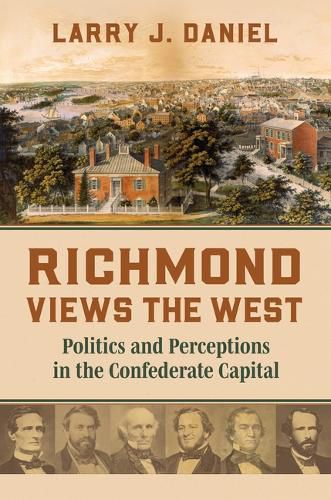Readings Newsletter
Become a Readings Member to make your shopping experience even easier.
Sign in or sign up for free!
You’re not far away from qualifying for FREE standard shipping within Australia
You’ve qualified for FREE standard shipping within Australia
The cart is loading…






How did politicians, bureaucrats, reporters, and civilians in Richmond understand a war being fought a thousand miles away? Expert Civil War historian Larry Daniel shows for the first time how poor intelligence, fierce politics, and cultural prejudice affected Confederate strategy in the Western Theater.
In his novel approach to understanding the Western Theater of the U.S. Civil War, Larry Daniel brings new insight and understanding to the war without ever setting foot in the West. Rather, he takes readers to Richmond, Virginia, to see how the war was understood in the Confederate Capitol. We see in real time how the Jefferson Davis administration received, understood, and reacted to reports from the front, which often arrived in Richmond days after they were written. Daniel gives voice to cabinet members, War Department clerks, congressmen, capitol reporters, and even civilians, all watching the war unfold hundreds of miles away.
Although most of their attention was given to the enemies at their doorstep, Richmond was still rocked by the disastrous losses across the Appalachians, especially Fort Donelson, New Orleans, Vicksburg, and Atlanta. Still, incomplete information and biased press reports deified certain western generals in the public imagination, including P. G. T. Beauregard, Sterling Price, and Joseph E. Johnston, whose performance did not justify such public adoration. Richmonders' "Virginia-first" military strategy and their aristocratic sense of cultural superiority over the diverse regions and cultures of the West blurred their view and damaged their ability to make strong strategic decisions. The Davis administration's preference for territorial and static defense, influenced by their strategic and political (mis)understanding of the region, set the war in the West on a spiraling downward trend from which it never recovered.
Students of the Civil War cannot fully understand the battles that took place in the woods of south-central Tennessee, along the banks of the Tennessee River, across the bluffs and backwaters of the Mississippi Delta, or in the red clay and thickets of North Georgia without understanding what was happening a world away in Richmond. This is that story.
$9.00 standard shipping within Australia
FREE standard shipping within Australia for orders over $100.00
Express & International shipping calculated at checkout
How did politicians, bureaucrats, reporters, and civilians in Richmond understand a war being fought a thousand miles away? Expert Civil War historian Larry Daniel shows for the first time how poor intelligence, fierce politics, and cultural prejudice affected Confederate strategy in the Western Theater.
In his novel approach to understanding the Western Theater of the U.S. Civil War, Larry Daniel brings new insight and understanding to the war without ever setting foot in the West. Rather, he takes readers to Richmond, Virginia, to see how the war was understood in the Confederate Capitol. We see in real time how the Jefferson Davis administration received, understood, and reacted to reports from the front, which often arrived in Richmond days after they were written. Daniel gives voice to cabinet members, War Department clerks, congressmen, capitol reporters, and even civilians, all watching the war unfold hundreds of miles away.
Although most of their attention was given to the enemies at their doorstep, Richmond was still rocked by the disastrous losses across the Appalachians, especially Fort Donelson, New Orleans, Vicksburg, and Atlanta. Still, incomplete information and biased press reports deified certain western generals in the public imagination, including P. G. T. Beauregard, Sterling Price, and Joseph E. Johnston, whose performance did not justify such public adoration. Richmonders' "Virginia-first" military strategy and their aristocratic sense of cultural superiority over the diverse regions and cultures of the West blurred their view and damaged their ability to make strong strategic decisions. The Davis administration's preference for territorial and static defense, influenced by their strategic and political (mis)understanding of the region, set the war in the West on a spiraling downward trend from which it never recovered.
Students of the Civil War cannot fully understand the battles that took place in the woods of south-central Tennessee, along the banks of the Tennessee River, across the bluffs and backwaters of the Mississippi Delta, or in the red clay and thickets of North Georgia without understanding what was happening a world away in Richmond. This is that story.